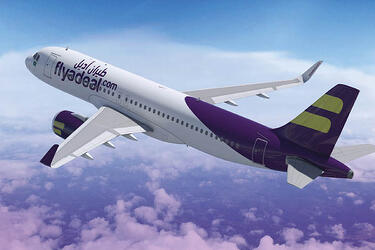Saudi Arabian airline flyadeal will wait until investigations into two Boeing 737 MAX crashes are completed before deciding whether to proceed with a signed order for 30 of the jets, reported Reuters, citing its chief executive.
The 737 MAX has been banned from flying in most countries after an Ethiopian Airlines crash on Sunday that killed all 157 people on board.
This was a second deadly incident involving the relatively new Boeing model in five months. In October, a Lion Air jet crashed in Indonesia killing all 189 people on board.
"We’re in a hold for the moment. We are monitoring and in constant contact with Boeing and will wait for the outcomes to be known before moving forward," stated CEO Con Korfiatis.
Boeing Company’s $600 billion-plus order book for its 737 Max began shaking after several big customers threatened to reconsider their purchases in the wake of the Ethiopian Airlines crash, the second deadly accident involving the plane since October, reported Bloomberg.
Flyadeal ordered 30 Boeing 737 MAX 8s last December with purchasing options for 20 more in a deal Boeing said was worth $5.9 billion at list prices.
Flyadeal, a unit of Saudi Arabian Airlines, said in December it would switch from Airbus and purchase up to 50 737 Max jets, subject to final terms being reached. The company says it’s waiting on the results of the investigation.
“We’re closely monitoring the situation and are in constant contact with Boeing,” the company said in an email. “There are no conclusions to be drawn at this time.”
VietJet Aviation JSC, which doubled its order to about $25 billion only last month, said it will decide on its future plans once the cause of the tragedy has been found.
Kenya Airways too is reviewing proposals to buy the Max and could switch to Airbus SE’s rival A320. Russia’s Utair Aviation PJSC is seeking guarantees before taking delivery of the first of 30 planes.
That’s as Indonesia’s Lion Air firms up moves to drop a $22 billion order for the 737 in favour of the Airbus jet, according to a person with knowledge of the plan.
Separately, Garuda Indonesia plans to cut orders of the Boeing plane and a $5.9 billion order from a unit of Saudi Arabian Airlines hangs in the balance.
The 737, which first entered service in the late 1960s, is the aviation industry’s best-selling model and Boeing’s top earner. The re-engineered Max version has racked up more than 5,000 orders worth in excess of $600 billion, including planes that have already been delivered, said the Bloomberg report.
Boeing, whose shares have lost 11 per cent of their value this week, faces escalating financial risk after two disasters involving its newest narrow-body jet in the past five months.
The stock inched up 0.5 percent on Wednesday in New York after seeing its biggest two-day drop in almost a decade.
The deadly crash in Ethiopia comes just about five months after the Oct. 29 crash of another Boeing 737 Max plane, operated by Indonesia’s Lion Air.
The relationship between the carrier and Boeing soured after the manufacturer pointed to maintenance issues and human error at Lion as the underlying cause, even though the planes pilots had been battling a computerized system that took control following a sensor malfunction.
Sunday’s loss of an Ethiopian Airlines 737, in which 157 people died, bore similarities to the Asian tragedy, stoking concern that a feature meant to make the upgraded Max safer than earlier planes has actually made it harder to fly.
Boeing is in crisis as most of the world grounded the plane. On Wednesday, US regulators joined the global chorus by grounding the plane, citing evidence showing the Ethiopian Airlines flight may have experienced the same problem as the plane that went down five months ago off Indonesia.
“With extensive grounding of the 737 Max, near term news could get worse for Boeing before it improves,” Cai von Rumohr, an analyst with Cowen & Co., said in a note.
However, he added, because the company is readying an update to its flight-control software, “we don’t see meaningful long term risk.”































